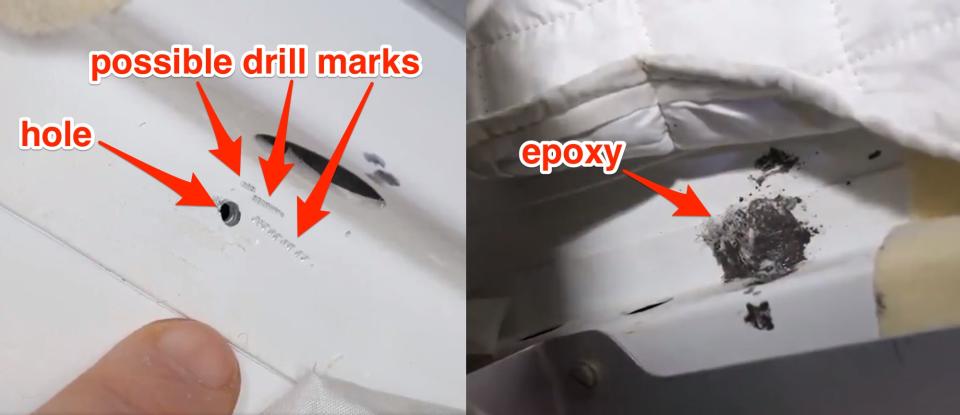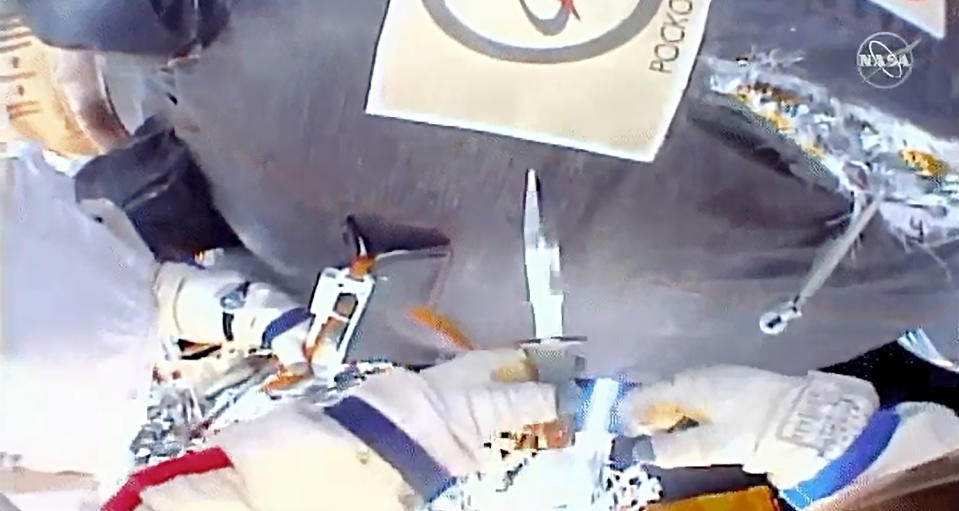Russian cosmonauts stabbed a spaceship with a knife to locate a mysterious hole at the International Space Station
A drill hole was discovered and plugged in a Soyuz spacecraft at the International Space Station in September.
Two Russians performed a spacewalk outside the ISS on Tuesday to study the leak site from the outside.
The cosmonauts used a knife to stab and hack away at insulation in the Soyuz spacecraft.
They took photos of the hole and collected samples of the Soyuz for analysis back on Earth.
When crew members float outside the International Space Station to build, inspect, or repair the $US150 billion orbiting laboratory, they usually follow a meticulous plan.
But a spacewalk by two Russian cosmonauts on Tuesday was anything but typical.
Oleg Kononenko and Sergey Prokopyev spent nearly eight hours cutting, stabbing, and hacking away at a Russian Soyuz spaceship with a knife and pair of scissors some 250 miles above Earth.
Kononenko and Prokopyev's goal was to find and document a hole in the Soyuz MS-09 spaceship, which docked with the ISS in June.
The story of the hole - which one space reporter described as "officially nuts" - began on August 28, when sensors picked up a small air leak in the orbital laboratory's air supply. By September 4, Prokopyev and others had located a hole, 2 millimetres in diameter, in the Soyuz spaceship.
Some initial guesses about the hole's origin suggested a small micrometeoroid or piece of space debris had struck the Soyuz. But the story took a wild turn after NASA shared pictures showing what looked like scuff marks made by the wandering bit of a power drill. (The agency later deleted the images.)
Dmitry Rogozin, the head of Russia's space agency, Roscosmos, said in September that inspectors had narrowed the cause down to "a technological mistake of a technician" during the Soyuz MS-09's construction.
"It is clear that the damage was caused from inside the spacecraft," he added.
It appeared that someone had sealed over the drill hole on Earth and that the painted-over plug broke loose shortly after the Soyuz reached the ISS.
Knife-wielding cosmonauts hack away at a mystery
The hole was in the Soyuz MS-09's spherical orbital module, which docks with the ISS.
As part of Roscosmos' ongoing investigation into the incident, Kononenko and Prokopyev had to amble over to the Soyuz's orbital module in bulky spacesuits, then cut through thick insulation and shielding that surrounds the spaceship's metal outer hull.
They were asked to look for evidence of the internal hole on the hull and gather samples that might help investigators on Earth figure out what happened.
NASA TV aired live footage of their spacewalk on Tuesday starting at 10:59 a.m. ET, including views recorded from the cosmonauts' helmets. The recordings offered English translations of what the men were saying, and they appeared to struggle and strain to get the job done.
The cosmonauts, who relied on a wobbly robotic arm to reach the location they wanted to inspect, started by puncturing the insulation with a knife, then tried using other tools, including a pair of scissors, to cut deeper.
This proved difficult, so one cosmonaut began to repeatedly stab and hack at the Soyuz with the knife while the other held him down. This helped them cut through the insulation and shielding.
Mission controllers asked them to take breaks and be careful, since an accidental cut in a spacesuit might give a cosmonaut just minutes to get to an airlock before suffocating.
For the most part, though, the cosmonauts rebuffed mission controllers and kept hacking away.
View this content at Business Insider
The procedure also spooked space reporters who watched the men work live on NASA TV.
"Not gonna lie... This spacewalk is kind of freaking me out," Miriam Kramer, Mashable's science editor, tweeted during the event.
After hours of labour - during which much insulation was shed into space - Kononenko and Prokopyev located a hole in the hull of the Soyuz. They also gathered samples of material around the site for up-close inspection and analysis on Earth.
Remarkably, this is not the first time cosmonauts have wielded knives on a spacewalk and stabbed a Soyuz.
On July 10, 2008, two cosmonauts left the ISS with a knife and used it cut away at insulation around explosive bolts and inspect them. Such bolts are used to separate the Soyuz's crew capsule from the rest of the ship, including the orbital module, which essentially becomes dead weight during a landing.
Some of these bolts had failed during previous Soyuz landings, causing rough and imprecise returns to Earth, so Roscosmos and NASA wanted to retrieve one for testing.
The Soyuz MS-09 that cosmonauts hacked at on Tuesday is set to return to Earth next Wednesday, according to NASA. It will carry Alexander Gerst, a German astronaut with the European Space Agency, and Serena Auñón-Chancellor, a NASA astronaut.
They won't need the unsightly, hacked-up orbital module of the Soyuz - the two astronauts will separate from that part before attempting to return home.

 Yahoo Finance
Yahoo Finance 





